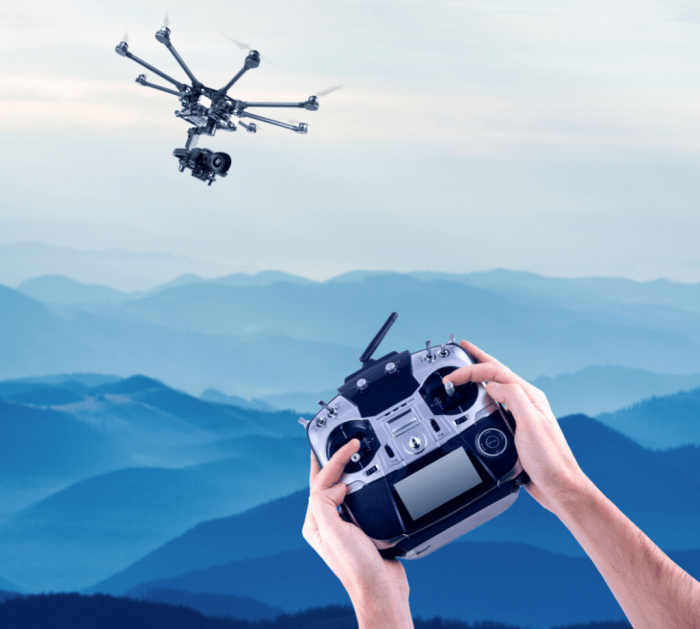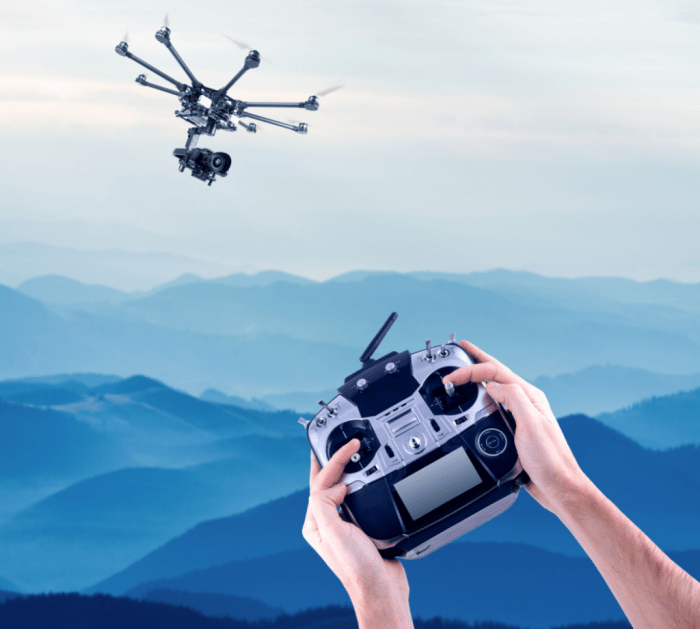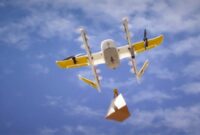Europes drone sector new jobs – Europe’s drone sector is experiencing a surge in growth, creating a wave of new jobs across various industries. From logistics to agriculture, construction to security, drones are revolutionizing the way we work, and with this transformation comes a demand for skilled professionals to operate, maintain, and innovate within this exciting field.
This booming sector is fueled by a combination of factors, including technological advancements, regulatory frameworks that are becoming increasingly drone-friendly, and a growing need for efficient and cost-effective solutions in diverse industries. The result? A surge in job creation that is attracting talent and creating new opportunities for individuals looking to embark on a career in this rapidly evolving field.
The Rise of Europe’s Drone Sector
The European drone industry is experiencing a period of rapid growth, driven by technological advancements, increasing demand across various sectors, and supportive regulatory frameworks. This burgeoning sector is attracting significant investment and creating new job opportunities.
Key Players and Market Size
The European drone market is characterized by a diverse landscape of players, including established aerospace giants, innovative startups, and specialized service providers. Some of the key players in the European drone sector include:
- Airbus: A leading aerospace manufacturer, Airbus has a strong presence in the drone sector, offering various drone platforms and solutions for commercial and defense applications.
- Thales: A global technology leader, Thales is actively involved in the development of drone systems for defense, security, and civil applications.
- Safran: A leading aerospace equipment supplier, Safran is a key player in the drone engine and propulsion systems market.
- Drone Volt: A leading drone service provider, Drone Volt offers a range of drone services, including inspection, surveillance, and data collection, across various industries.
- Delair: A drone technology company, Delair specializes in providing drone-based data analytics and software solutions for various sectors.
The European drone market is expected to reach a significant size in the coming years. According to a report by MarketsandMarkets, the European drone market is projected to grow at a CAGR of 22.5% from 2023 to 2028, reaching a value of USD 10.5 billion by 2028.
This growth is attributed to several factors, including increasing adoption of drones across various industries, advancements in drone technology, and supportive regulatory frameworks.
Drivers of Growth
The European drone sector is experiencing robust growth due to several key drivers, including:
- Technological Advancements: Advancements in drone technology, such as increased flight time, payload capacity, and autonomous capabilities, are expanding the potential applications of drones across various sectors.
- Growing Demand across Industries: Drones are increasingly being adopted across various industries, including agriculture, infrastructure inspection, logistics, and security, to improve efficiency, reduce costs, and enhance safety.
- Favorable Regulatory Environment: The European Union has implemented supportive regulatory frameworks for drone operations, providing clarity and certainty for drone operators and promoting the development of the drone industry.
- Government Initiatives: Several European governments are investing in drone research and development, promoting the use of drones in various sectors, and creating favorable conditions for the growth of the drone industry.
Impact of Regulatory Frameworks, Europes drone sector new jobs
Regulatory frameworks play a crucial role in shaping the development of the drone industry in Europe. The European Union has established comprehensive regulations for drone operations, covering aspects such as airspace management, operator licensing, and safety standards. These regulations aim to ensure the safe and responsible integration of drones into the airspace while fostering innovation and growth in the drone sector.The European Union’s regulatory framework for drones has several key components, including:
- Open Category: This category covers drones weighing less than 25 kg and operating below 120 meters altitude, with limited restrictions. This category is designed to encourage the use of drones for recreational and commercial purposes.
- Specific Category: This category covers drones with specific operational requirements, such as those operating in urban areas or carrying payloads. Operators in this category must meet specific requirements and obtain authorization from national authorities.
- Certified Category: This category covers drones with higher risk profiles, such as those operating in congested airspace or carrying hazardous materials. Operators in this category must undergo rigorous certification processes and meet stringent safety standards.
These regulations provide a clear framework for drone operations, fostering innovation and investment in the drone industry while ensuring safety and responsible use of drones.
“The European Union’s drone regulations are considered to be among the most comprehensive and progressive in the world, providing a solid foundation for the growth of the drone industry in Europe.”
Job Creation in the Drone Sector
The burgeoning European drone sector is not only transforming industries but also creating a wave of new job opportunities. As drones become increasingly integrated into various sectors, the demand for skilled professionals is surging, leading to a diverse range of roles across the drone ecosystem.
Drone Industry Job Roles
The European drone sector offers a wide range of career paths, catering to diverse skill sets and interests. Here are some prominent job roles emerging within the industry:
- Drone Pilot:This role involves operating drones for various applications, including aerial photography, videography, inspection, and delivery. Pilots need to be proficient in drone operation, safety regulations, and flight planning.
- Drone Technician:These professionals are responsible for maintaining, repairing, and troubleshooting drones. They possess expertise in drone mechanics, electronics, and software.
- Drone Data Analyst:This role involves analyzing data collected by drones, extracting insights, and generating reports. Data analysts need strong analytical skills, data visualization capabilities, and knowledge of relevant software.
- Drone Software Developer:These professionals develop and maintain software for drone applications, including flight control systems, data processing algorithms, and drone-specific applications.
- Drone Integration Specialist:This role involves integrating drones into existing systems and workflows across various industries, including logistics, agriculture, and infrastructure inspection.
- Drone Regulatory Specialist:These professionals ensure compliance with drone regulations and policies, advising companies on safety procedures, licensing requirements, and airspace management.
- Drone Training Instructor:These professionals provide training to pilots, technicians, and other drone professionals, ensuring they meet industry standards and safety protocols.
Skill Sets Required for Drone Jobs
The drone industry demands a diverse range of skills, encompassing technical, analytical, and regulatory expertise. Here are some essential skills required for various drone roles:
- Technical Skills:Proficiency in drone operation, maintenance, and repair, including knowledge of drone mechanics, electronics, and software.
- Data Analysis Skills:Ability to analyze and interpret data collected by drones, using data visualization tools and statistical analysis techniques.
- Software Development Skills:Expertise in programming languages, software development methodologies, and drone-specific software development tools.
- Regulatory Compliance Skills:Understanding of drone regulations, airspace management, and safety protocols, ensuring compliance with relevant laws and policies.
- Communication and Interpersonal Skills:Effective communication skills for collaborating with colleagues, clients, and regulatory bodies, ensuring clear and concise information exchange.
Job Growth in the Drone Sector Compared to Other Industries
The European drone sector is projected to experience significant job growth in the coming years, outpacing many other industries. According to a study by the European Union Aviation Safety Agency (EASA), the drone sector is expected to create over 100,000 jobs in Europe by 2030.
“The drone sector is poised to create a significant number of jobs in Europe, contributing to economic growth and innovation. The sector’s rapid expansion is driven by technological advancements, regulatory developments, and increasing adoption across various industries.”
EASA Study
The drone sector’s job growth is fueled by factors such as increasing drone adoption across industries, technological advancements leading to new applications, and supportive government policies. The sector’s growth is expected to outpace traditional industries, offering attractive career opportunities for skilled professionals.
Discover how how an outsiders freedom can make successful startup founders has transformed methods in this topic.
Drone Applications Driving Job Growth
The burgeoning drone sector in Europe is not just about technological innovation; it’s also creating a wave of new job opportunities across various industries. Drones are transforming traditional workflows, automating tasks, and opening up new avenues for efficiency and productivity.
This has resulted in a surge in demand for skilled professionals with expertise in drone operation, maintenance, data analysis, and related fields.
Key Sectors and Job Creation
Drones are finding applications in a diverse range of sectors, each with its own unique set of job opportunities. Here’s a closer look at some of the key areas where drones are driving job growth in Europe:
Logistics
Drones are revolutionizing the logistics industry by offering faster, more efficient, and cost-effective delivery solutions. In particular, last-mile delivery, where goods are transported from distribution centers to end consumers, is seeing a significant increase in drone adoption. This has created new jobs for drone pilots, maintenance technicians, and logistics specialists.
Agriculture
Drones are transforming agricultural practices by providing farmers with real-time insights into crop health, soil conditions, and pest infestations. They are also being used for precision spraying, which reduces chemical usage and improves environmental sustainability. This has led to a demand for drone operators, data analysts, and agricultural specialists with drone expertise.
Construction
Drones are playing an increasingly important role in construction projects, enabling faster and more accurate site surveys, inspections, and progress monitoring. They are also being used for 3D modeling, which helps architects and engineers visualize and plan construction projects more effectively.
This has created new job opportunities for drone pilots, engineers, and construction professionals with drone experience.
Security
Drones are being deployed for a variety of security applications, including surveillance, border patrol, and search and rescue operations. They offer a cost-effective and efficient way to monitor large areas, detect potential threats, and respond to emergencies. This has created new jobs for security personnel, drone operators, and data analysts.
Drone Applications and Job Creation
| Sector | Application | Job Impact | Future Trends |
|---|---|---|---|
| Logistics | Delivery, Inspection | Increased demand for pilots, maintenance technicians | Growing automation, integration with other technologies |
| Agriculture | Crop monitoring, spraying | Demand for data analysts, drone operators | Precision farming, increased use of AI |
| Construction | Site surveys, inspections | Demand for engineers, drone pilots | 3D modeling, automated construction |
| Security | Surveillance, border patrol | Demand for security personnel, drone operators | Increased use of AI, integration with other security systems |
Challenges and Opportunities for Job Creation: Europes Drone Sector New Jobs
The European drone sector, while brimming with potential, faces several challenges that could hinder its growth and job creation. These challenges are intertwined with the sector’s opportunities, creating a complex landscape that requires a strategic approach for navigating both hurdles and possibilities.
Challenges to Job Creation
The European drone sector faces a range of challenges that must be addressed to foster sustainable growth and job creation. These challenges include:
- Safety Concerns:Public perception of drone safety is a major hurdle. Accidents and near-misses, though relatively infrequent, can generate negative headlines and raise concerns about drone operations. Regulators are working to establish robust safety standards and certification processes, but public trust needs to be built through continuous education and demonstrably safe operations.
- Privacy Issues:Concerns about data privacy and potential misuse of drone technology persist. Regulations are being developed to address these concerns, but striking a balance between innovation and privacy protection is crucial. Transparency, responsible data handling practices, and clear guidelines for drone operators are essential to building public trust.
- Lack of Skilled Labor:The drone sector requires a specialized workforce with skills in areas such as drone piloting, maintenance, data analysis, and software development. A shortage of qualified professionals can hinder the sector’s growth. Bridging this gap requires investment in education and training programs, fostering collaborations between industry and academia, and encouraging career pathways in the drone sector.
Opportunities for Job Creation
Despite the challenges, the European drone sector presents numerous opportunities for job creation. These opportunities include:
- Development of New Technologies:The drone industry is constantly evolving, with new technologies emerging in areas such as autonomous flight, advanced sensors, and artificial intelligence. These advancements create opportunities for research and development, leading to new products and services, and ultimately, new jobs in engineering, software development, and related fields.
- Increased Investment:The drone sector is attracting significant investment from both public and private sources. This investment fuels innovation, drives growth, and creates opportunities for new businesses and job creation across the value chain, from manufacturing and logistics to data analytics and software development.
- Government Support:Governments across Europe are recognizing the potential of the drone sector and are implementing policies to support its growth. These policies include regulatory frameworks, funding programs, and initiatives to foster innovation and job creation. Examples include the European Union’s Horizon Europe program, which supports research and innovation in drone technology, and national initiatives such as the UK’s Drone Technology Roadmap, which Artikels a strategy for developing the drone sector.
The Future of Europe’s Drone Sector

The European drone sector is poised for significant growth in the coming years, driven by advancements in technology, increasing adoption across industries, and supportive regulatory frameworks. The future holds exciting possibilities for the sector, with emerging technologies, new applications, and evolving business models shaping its trajectory.
The Impact of Emerging Technologies
The rapid development of artificial intelligence (AI) and autonomous drone technologies is set to revolutionize the European drone sector. AI-powered drones will become increasingly sophisticated, capable of performing complex tasks with minimal human intervention. This will enhance efficiency, safety, and accuracy in various applications, from aerial surveillance and inspection to delivery and logistics.
Autonomous drones, equipped with advanced navigation and obstacle avoidance systems, will enable operations in challenging environments and remote areas, expanding the scope of drone applications.
Future Trends in the Drone Sector
- Development of New Applications:The drone sector is constantly evolving, with new applications emerging across industries. Drones will play a crucial role in sectors like agriculture, infrastructure inspection, environmental monitoring, and disaster response. For instance, drones equipped with sensors and AI algorithms can analyze crop health, identify infrastructure defects, and monitor environmental changes in real-time, providing valuable insights for decision-making.
- Increased Integration with Other Industries:Drones are becoming increasingly integrated with other industries, such as logistics, transportation, and telecommunications. This integration will create new opportunities for collaboration and innovation. For example, drones can be used to deliver packages, inspect power lines, and provide aerial connectivity in remote areas.
- Rise of Drone-as-a-Service Models:The drone-as-a-service (DaaS) model is gaining traction, offering businesses access to drone technology and expertise without the need for significant upfront investment. DaaS providers offer a range of services, including drone operation, data analysis, and software development, making drone technology accessible to a wider range of users.
Expected Growth of the European Drone Sector
The European drone sector is projected to experience significant growth in the next 5-10 years, with new applications, expanding industries, and increased investment driving its expansion. The sector is expected to create numerous jobs across various areas, including drone operation, maintenance, data analysis, software development, and research.
ImageA bar graph illustrating the projected growth of the European drone sector over the next 5-10 years. The graph highlights key areas of development and job creation, with different segments representing key applications (agriculture, logistics, infrastructure inspection, etc.) and job roles (drone pilots, data analysts, software engineers, etc.).
The graph demonstrates the substantial growth potential of the European drone sector, showcasing the increasing demand for skilled professionals and the expansion of drone-related activities across various industries.End Image



